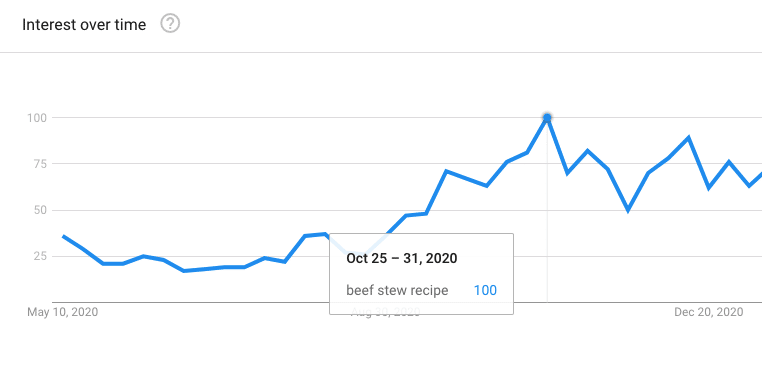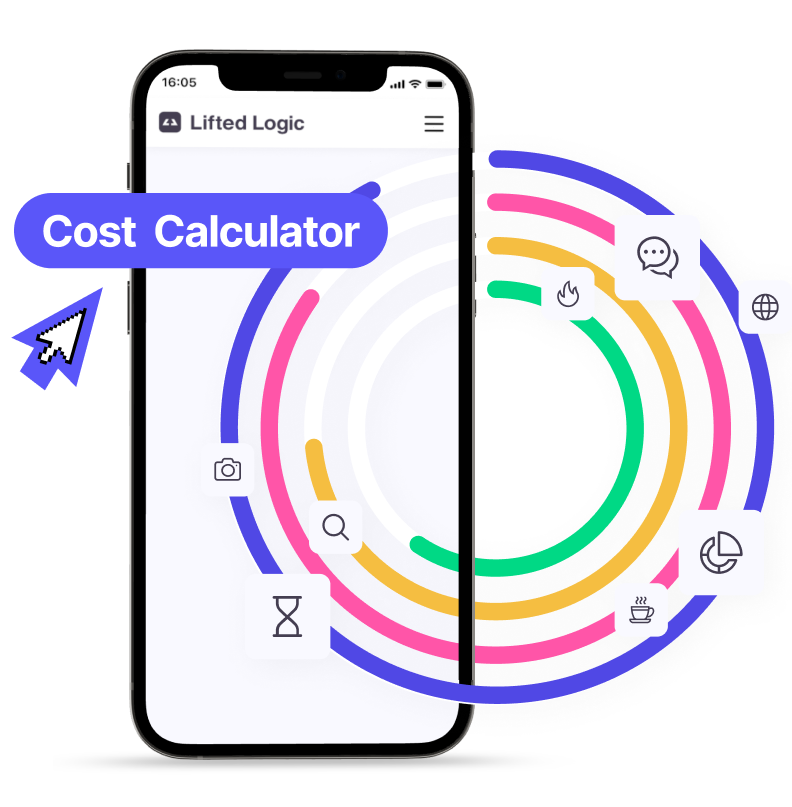If you’re familiar with SEO, you know that SERP ranking (namely, Google SERP ranking) is essential to drive organic traffic to your site. In turn, you hope to create leads for your business to gain more customers, and therefore, more profit. To understand SEO (Search Engine Optimization) it’s important to understand how Google works to determine which sites and pages rank on its SERP.
As SEO strategists and digital marketers ourselves, the team at Lifted Logic is always down to talk tech when it comes to anything to do with our industry. We’ve been creating custom websites and writing content that rank on Google SERPs for over a decade. We want to share our knowledge to demystify how Google SERP ranking works.
A Quick Introduction on How Google Gathers and Tracks Information on the Web
The first term you need to know is crawling Google crawls public webpages to look at the content, follow page links, and bring data back to the servers at Google.
Once Google web crawlers have gathered information from webpages, they organize and categorize it with a system called indexing. Google Search index takes key signals into account such as keywords and newness of site content. When Google indexes a webpage, it’s added to other entries for all the words it contains.
The index is basically Google’s own library of information that it pulls from to present you with search results
Why We Care About Google Crawling and Indexing
It takes some time for Google to crawl and index a site, which is one of the many factors that affects SERP ranking position. A webpage cannot immediately rank on the SERP once it’s published. It takes time for the crawling and indexing process to take place. Because of this timeline (which can take roughly a month), most SEO writers will plan and publish content ahead of time for what they would like to rank for.
You can use Google Trends to plan your content ahead of time for maximum visibility and ranking opportunity. For example, if Google trends tells us the keyphrase beef stew recipe hits its peak interest at the end of October, we would want to write our content about that keyphrase and publish it one or two months ahead of time to account for crawling and indexing time.

Write it in August, publish in September, and by the end of October, Google will have indexed the post and hopefully include it in the SERP for this keyphrase at the end of October.
This is just one example of planning your content to befriend Google and increase your site’s SERP ranking. There are plenty of other things Google takes into consideration beyond posting timely content.
Factors That Affect Google SERP Ranking
While they don’t tell us everything to remain m y s t e r i o u s ️ ️, Google does a great job of summarizing how their search algorithm works. Using this information, SEO writers can work backwards to determine how to write content that pleases the algorithm.
The User Intent of Keyphrase(s)
When you type words into the Google search bar, this is your search query. We can learn a lot of information from analyzing people’s search queries; one of the most insightful pieces of this information is user intent.
User intent is the purpose behind someone’s search query. What kind of the results are they intending to get from the words they type?
Read more on User Intent →
Google does its best to understand user intent to create the most helpful SERP for you. It will use the words from your query to determine the category of information you’re looking for, like transactional, informational, and so on.
It even uses synonyms (words with exact and nearly exact meanings) to show you results about the topic you’re searching. Fun fact: this synonym system took over five years to create, and it improves over 30% of results across multiple languages!
As an SEO content writer, it’s imperative that you understand user intent before choosing the best keyphrase for your web page. You want to make sure that the content you write aligns with the user intent of the phrase. This will help your Google SERP ranking!
For example, say you’re a baker and you own a bakery. You want to promote your new red velvet cupcakes. You find that the keyphrase red velvet cupcake recipe has a really high monthly search volume, but you’re selling red velvet cupcakes.
The user intent of red velvet cupcake recipe is to find a recipe for the cupcakes, not information on where to buy some. If you write about your bakery’s red velvet cupcakes using red velvet cupcake recipe as your main keyphrase, Google can recognize that the content doesn’t match up with the user intent of the keyphrase and choose to not rank your post
Instead, you could make your keyphrase red velvet cupcakes near me. This aligns with someone whose user intent is to purchase red velvet cupcakes, which you are selling. Bada bing bada boom.
Best practice is to choose an h1 keyphrase where you can align the topic of your post with the user intent of the keyphrase. This gives your post the best chance of doing well on the SERP ranking for that keyphrase.
The Quality of Your Content
Your SERP position is also determined by the quality of the content you post. Whether it’s a blog, service page, or anything else on your site, the page should offer information that’s helpful to the user for whatever the page says it’s about.
Google matches words from search queries with relevant web pages, and it also tries to prioritize the most reliable sources of information. It does this by having a few identifying traits of a page such as pages that many users seem to value. Other prominent sites linking to the page may show this. It also uses aggregated feedback from its Search quality evaluation process.
Google also does its best to make sure that pages don’t rise in rank through deceptive tactics (such as link buying or invisible page text). These tactics are a big NO for many reasons, and they are definitely not sustainable ✋
As Lifted Logic content writers, there are a few other traits we believe make high-quality SEO content.
Word Count
This is a more subjective opinion, but there is something to word count when writing and publishing long form content. Longer word counts can help your post rise in Google SERP ranking, so it’s a huge motivator for SEO writers.
More words make more room for use of synonyms (which we mentioned earlier Google likes!) and more use of your focus keyphrase. A longer word count also signals to Google that the content is more robust with information that may be useful to users.
While you shouldn’t push a long word count if your topic doesn’t have enough information to warrant it, having a word count of 1,000 – 2,500 words is a great way to help your SERP ranking position. That being said, people appreciate concision. If you can say it with fewer words, do that, but it’s good to have a target word count during your outline and research process to make sure you have enough relevant information to work with.
5 Tips for Improving Your Content Writing →
Grammar
To be blunt, bad grammar can instantly make a business site seem unprofessional or unreliable. We don’t make the rules! While grammar doesn’t always play a huge part in casual internet spaces like social media, you should absolutely care about your grammar when writing to increase your SERP ranking. Google doesn’t necessarily penalize you for grammar errors on your site, but it can affect the user experience, which in turn, may affect Google rank.
Don’t believe us? Check out our blog post, Does Grammar Impact Google Ranking?
Researched Material
Good content has the research to back it up. Links to reliable sources, a speaker with education and experience on the topic, case studies, and other pertinent information should be present. This shows that the content is well researched and thought out.
Relevant Content
Great content makes sure that it’s always relevant to the topic and focus keyphrase. All information in the content should relate to the main idea, and you should avoid repeating any information if possible, unless using it to summarize or emphasize a point.
Any content features such as images, videos, and external links should be pertinent. You can also create an even better conversation within your content by linking internally to other relevant posts that a user may find helpful on the topic. Like we’ve been doing throughout this post
Related: Writing for your Audience: SEO Blogging →
The Usability of Your Site
Usability means how easy it is for the average person to navigate around your site and find what they need. We could do a whole post on this (and maybe we will!), but it’s safe to say that users will bounce from a site pretty quickly if the site usability is sh*t.
Google listed the following as factors that they use to determine optimal site usability.
- Your site works well in different browsers: e.g. Chrome, Firefox, Safari, Internet Explorer.
- The site is mobile friendly for different devices (phones and tablets).
- Reasonable page load times.*
*Care to check your site’s page load time for desktop and mobile? Google has a free PageSpeed Insight tool for that.
Other User-Unique Factors
Google explains some user-unique traits that are different for each person using Google, making each user’s SERP results unique.
Past search history
Google can take your past searches into account and link similar topics you’ve been searching. This is very similar to the synonym feature Google uses for everyone.
Location
If a user has location settings turned on, these will factor into the user’s SERP.
For instance, if you’re in Kansas City and type in “football,” Google will most likely show you results about the Chiefs right at the top. GO CHIEFS
Search settings
Google account users can set their preferences even further than a user that isn’t signed into Google. Users can set how many results per page they want, region settings, SafeSearch, and more.
Honorable Mentions | Google SERP Ranking
While these aren’t included in Google’s published Search Algorithm and Ranking System, these two traits will also help your SERP ranking.
Domain Authority
Domain authority (DA) is a rating of a site’s search engine ranking developed by Moz. The score ranges from 1 to 100, and the higher the score the better the rank.
The best way to improve your domain authority score is abiding by great SEO practices. While there are a ton of factors that Moz takes into consideration when calculating DA, one of the most important is the amount of links from other pages that are well-linked.
We should mention that domain authority scores for a small business versus a giant website like Amazon are going to be vastly different. The best way to measure is to compare your DA score to a competitor with a similar business size, then set goals to improve in that DA score range.
Related: What is Domain Authority—and Do I Need It? →
Link Juice
No, this isn’t your favorite cocktail from college. Link juice is a term for link equity, a search engine ranking factor that comes from the idea that certain links between sites pass value and authority from one site to the next. While we could get much more in depth, here’s the quick and dirty of what to know about link juice.
Moz outlines a few ways that link equity is determined:
- Is the link relevant to the content?
- Is the site that the link goes to an authoritative site?
- Where is the link on the page? (Footer links aren’t given as much value.)
- Do all the links on the page work?
What to Remember to Improve Your Google SERP ranking
There’s no one magical way to instantly improve your site’s SERP ranking. It takes a lot of hard work, strategy, and time. The best way to rank well and improve your organic site traffic is through hard work on your end.
In summary, to improve your Google SERP Ranking:
- Understand user intent when crafting your SEO strategy.
- Put out high-quality content: make sure it’s well-written, researched, and informative.
- Make your site user friendly for different devices and browsers.
And while you’re at it, try to keep tabs on your site’s domain authority and link equity.
Remember, Google is always evolving, and so is their algorithm. Keep your SEO strategy up to snuff and evolve with it!
Come to Lifted Logic for a Customized Strategy To Increase Your Google SERP Ranking
The SEO strategists at Lifted Logic take the time to get to know your business and find the best way to showcase it through SEO content writing. Whether you choose to have us write your SEO content or elect to write it yourself, we do free SEO training for our clients!
At Lifted Logic, we love to help our clients feel more confident and informed about writing for the digital web space.
Reach out to schedule a free consultation with our owner, Adam Fichman, to discuss how an SEO strategy can help the SERP ranking of your website.





